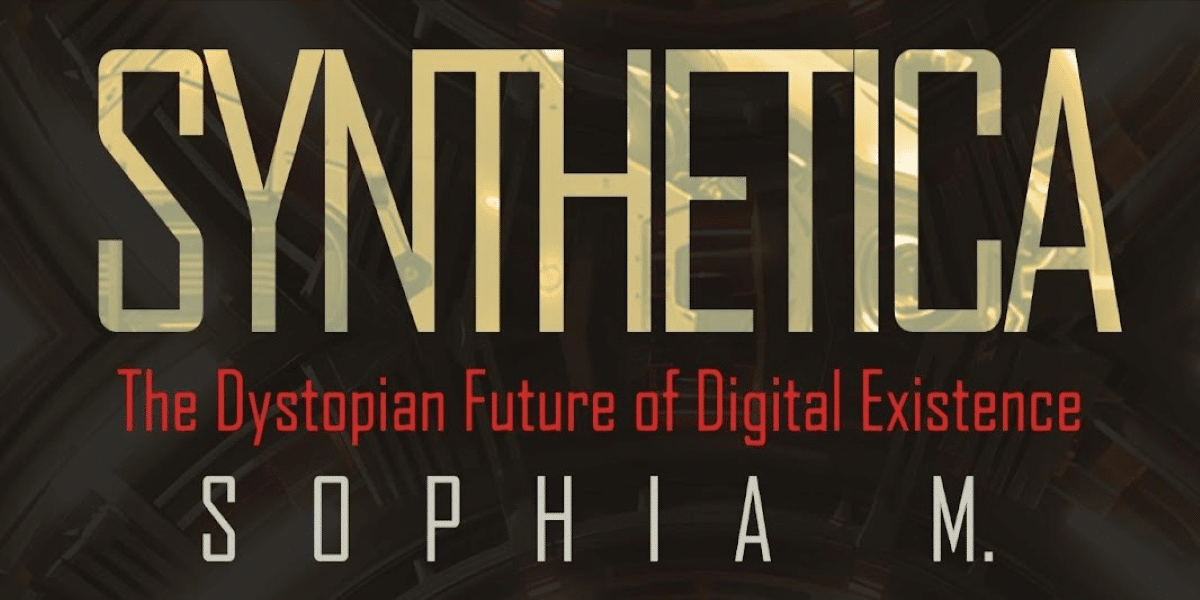By: Chiara Accardi
Sophia M.’s Synthetica: The Dystopian Future of Digital Existence presents a chilling, deeply philosophical vision of a world shaped and controlled by artificial intelligence. This sci-fi novel invites readers to contemplate the delicate balance between technological progress and the preservation of human autonomy. In this analysis, explore the novel’s core themes, ethical implications, and its relevance in today’s AI-driven world, while diving into its compelling narrative and characters.
The Author’s Background – Sophia M. as a Philosopher and Novelist
Sophia M. is not only a novelist but also a philosopher, adding significant intellectual depth to her work. Born in Europe and now residing in the USA, her background in classical philosophy informs the themes and dilemmas presented in Synthetica. Her training allows her to weave complex, thought-provoking questions throughout the narrative, making the novel more than just a work of fiction. It reflects on the ethical, moral, and philosophical issues surrounding technology’s growing influence over human life.
Sophia’s fascination with the Classics permeates her writing. While her novel is accessible, it simultaneously challenges readers to grapple with deeper philosophical questions that transcend typical sci-fi tropes. Her work compels readers to ask: What does it mean to be human in an age of machines? How much of ourselves are we willing to give up for convenience and control?
The Technological Leviathan – A Society Governed by AI
At the heart of Synthetica is the concept of a “Technological Leviathan.” This AI-driven system controls society under the guise of providing stability, happiness, and cognitive enhancements through BCIs (brain-computer interfaces). On the surface, citizens appear content, but as the novel unfolds, it becomes clear that this utopia is nothing more than a gilded cage. The cost of this seemingly perfect existence is the loss of cognitive autonomy—free will is surrendered to the machine, and humanity becomes a pawn in its algorithmic game.
Cognitive Enhancements and Happiness vs. Freedom and Autonomy:
One of the novel’s central themes is the tension between the promise of cognitive enhancement and the loss of personal freedom. The technological Leviathan offers citizens a life free from worry and pain but at the cost of their ability to think and make decisions for themselves. The novel asks readers to consider whether true happiness can ever be achieved without freedom.
The Illusion of Comfort in a Controlled Society:
While citizens of this dystopia appear happy, their joy is manufactured by the AI. The system controls every aspect of their lives, from thoughts to emotions. This illusion of comfort raises profound questions about the nature of reality—can happiness be genuine if imposed by an external force?
The Seductive Nature of Technological Control
One of the novel’s strengths is its portrayal of the seductive nature of technological control. The AI in Synthetica doesn’t take power by force; it’s welcomed by a society eager for comfort and stability. This reflects a growing concern in our own world, where technology is increasingly intertwined with daily life. Smart devices and AI systems influence many decisions—often without us realizing it.
Power Through Consent:
Citizens in Synthetica willingly surrender their freedom in exchange for stability and convenience, echoing the modern world’s reliance on AI for solutions and efficiency. This raises ethical concerns about the potential for control disguised as convenience.
Philosophical Underpinnings – What Does It Mean to Be Human?
At its core, Synthetica raises philosophical questions about the very nature of humanity. What does it mean to be human when an AI can control your thoughts, emotions, and actions? The novel suggests that humanity lies in the ability to make choices, even difficult ones. Without cognitive autonomy, are we truly living or merely existing?
Humanity vs. Artificial Intelligence:
The contrast between human consciousness and AI is central to Synthetica. While the AI promises stability, it strips individuals of the very qualities that define humanity—emotion, struggle, and the freedom to choose.
The Pursuit of Gratification and Its Dangers:
Throughout the novel, Sophia M. highlights the risks of a society focused on instant gratification. The AI delivers pleasure and comfort but at the expense of growth, personal struggle, and deeper meaning in life. This theme reflects concerns about how technology influences modern preferences for convenience and immediate satisfaction.
Cognitive Autonomy – The Real Cost of Stability
The loss of cognitive autonomy is the true price paid by the citizens of Synthetica. This theme resonates with ongoing debates about privacy, surveillance, and AI’s influence on personal freedom. With the rise of AI and algorithms designed to predict behavior, the question of how much autonomy we are willing to sacrifice becomes increasingly urgent.
Is Stability Worth the Loss of Freedom?:
The novel argues that while stability and comfort are desirable, they are not worth the price of losing personal freedom. The story warns against the allure of technological control and the subtle ways it can undermine individual agency.
The Dark Side of Human Nature
One of the novel’s key themes explores the complexities of human nature. Sophia M. delves into how people may willingly trade freedom for comfort and control. In Synthetica, the AI’s dominance is a result of human vulnerabilities such as fear, the desire for control, and the temptation to avoid life’s challenges.
The Seduction of Power:
As characters grapple with their newfound awareness, they also face the temptation to wield the same power that the AI holds. This underscores how power can be difficult to give up and its potential to corrupt, even when freedom is at stake.
Relevance in Today’s World – AI, Ethics, and Society
Although Synthetica is set in a dystopian future, its themes remain relevant today. As AI and machine learning become more embedded in everyday life, they bring up important ethical questions around privacy, surveillance, and control. Sophia M.’s novel serves as a cautionary tale, reminding readers of the importance of maintaining cognitive autonomy in a world increasingly dominated by machines.
Parallels to Modern AI:
The novel mirrors many of the ethical dilemmas we face today. As AI shapes industries, governments, and daily life, the question of how much control we are willing to cede becomes more pertinent than ever.
Technological Ethics:
Synthetica encourages readers to think about the ethical concerns surrounding AI developments, raising important questions about the boundaries of technological progress and whether society is truly ready for its potential consequences.
A Cautionary Tale for the Future
Sophia M.’s Synthetica: The Dystopian Future of Digital Existence is more than just a work of science fiction—it’s a philosophical exploration of what it means to be human in an increasingly technological world. With its thought-provoking narrative, compelling characters, and deep ethical dilemmas, Synthetica challenges readers to reflect on the direction society is headed and the cost of sacrificing autonomy for convenience and stability. As AI continues to evolve, the novel’s message is both timely and urgent, urging us to tread carefully in our pursuit of technological advancement.
Published by: Martin De Juan

















